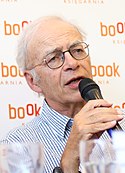Peter Singer Quote
That those who aim at happiness for happiness's sake often fail to find it, whereas others find happiness in pursuing altogether different goals, has been called ‘the paradox of hedonism’. It is not, of course, a logical paradox but a claim about the way in which we come to be happy. Like other generalizations on this subject, it lacks empirical confirmation. Yet it matches our everyday observations and is consistent with our nature as evolved, purposive beings. Human beings survive and reproduce themselves through purposive action. We obtain happiness and fulfillment by working towards and achieving our goals. In evolutionary terms, we could say that happiness functions as an internal reward for our achievements. Subjectively, we regard achieving the goal (or progressing towards it) as a reason for happiness. Our own happiness, therefore, is a by-product of aiming at something else and is not to be obtained by setting our sights on happiness alone.
That those who aim at happiness for happiness's sake often fail to find it, whereas others find happiness in pursuing altogether different goals, has been called ‘the paradox of hedonism’. It is not, of course, a logical paradox but a claim about the way in which we come to be happy. Like other generalizations on this subject, it lacks empirical confirmation. Yet it matches our everyday observations and is consistent with our nature as evolved, purposive beings. Human beings survive and reproduce themselves through purposive action. We obtain happiness and fulfillment by working towards and achieving our goals. In evolutionary terms, we could say that happiness functions as an internal reward for our achievements. Subjectively, we regard achieving the goal (or progressing towards it) as a reason for happiness. Our own happiness, therefore, is a by-product of aiming at something else and is not to be obtained by setting our sights on happiness alone.
Related Quotes
About Peter Singer
On two occasions, Singer served as chair of the philosophy department at Monash University, where he founded its Centre for Human Bioethics. In 1996 he stood unsuccessfully as a Greens candidate for the Australian Senate. In 2004 Singer was recognised as the Australian Humanist of the Year by the Council of Australian Humanist Societies. In 2005, The Sydney Morning Herald placed him among Australia's ten most influential public intellectuals. Singer is a cofounder of Animals Australia and the founder of the non-profit organization The Life You Can Save.
